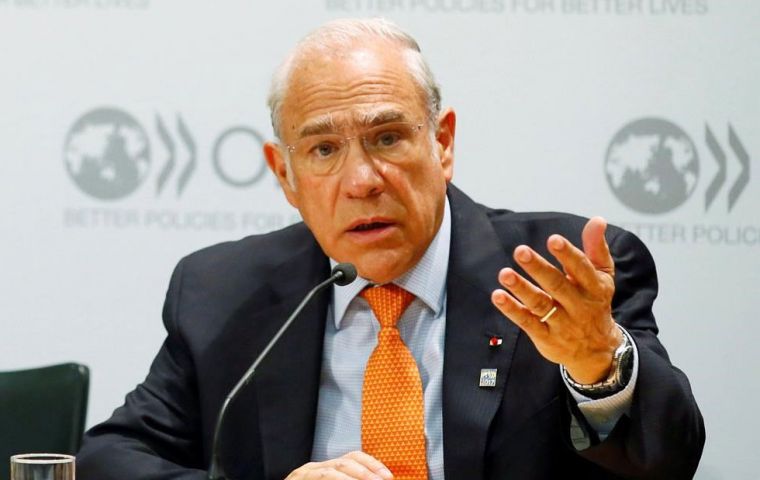MercoPress. South Atlantic News Agency
Colombia invited to join OECD; third Latin American member with Mexico and Chile
 “The accession of Colombia will contribute to our efforts to transform OECD into a more diverse and inclusive institution”, OECD Secretary-General Angel Gurría
“The accession of Colombia will contribute to our efforts to transform OECD into a more diverse and inclusive institution”, OECD Secretary-General Angel Gurría  The OECD entry marks a new achievement for outgoing President Juan Manuel Santos, whose administration undertook the challenge during his first term
The OECD entry marks a new achievement for outgoing President Juan Manuel Santos, whose administration undertook the challenge during his first term  “We are comparing ourselves to the best to be the best,” said Santos who is set to fly to Paris on May 30 to sign the Accession Agreement
“We are comparing ourselves to the best to be the best,” said Santos who is set to fly to Paris on May 30 to sign the Accession Agreement The Organization for Economic Cooperation and Development (OECD) announced on Friday that Colombia would be officially invited to join the group. The Paris-based economic organization was founded in 1961 and has traditionally included industrialized nations, though in recent years it has extended its membership to emerging economies.
“The accession of Colombia will contribute to our efforts to transform the OECD into a more diverse and inclusive institution, which will ensure our relevance in the years and decades ahead.” OECD Secretary-General Angel Gurria said, welcoming the new addition.
Colombia began its application process in 2013. As part of the requirements, 23 OECD committees conducted an in-depth evaluation of the country. Additionally, the Colombian government had to introduce major reforms to align its legislation, policies and practices to OECD standards.
The OECD entry marks a new achievement for outgoing President Juan Manuel Santos, whose administration undertook the challenge during his first term in office. Santos celebrated the decision, saying that it represented “great news” for Colombia.
“To enter this organization represents a very important step in the efforts to modernize our country,” the Colombian president said.
“We are comparing ourselves to the best to be the best,” he added. Santos is set to fly to Paris on May 30 to sign the Accession Agreement at the upcoming meeting of the OECD ministerial council.
Colombia will become the 37th member of the OECD and the third Latin American country to do so, after Mexico and Chile. Costa Rica is currently undergoing its own accession process.
Once marred by political violence from drug trafficking and a leftist insurgency, Colombia has experienced a revival in recent years. In 2016, the country celebrated a landmark peace agreement that ended Latin America's longest-running conflict and has also experienced economic growth.
The OECD's reported that economic growth in Colombia is projected to rise to around three percent in 2018 and 2019. The organization pointed to reduced corporate taxation, the historic peace agreement, better financing conditions and new infrastructure projects, as positive steps the country is taking to boost the economy.
A testament to Colombia's comeback is the growth in its tourism industry. According to the US International Trade Administration, as of 2017, tourism has become a major economic engine for the South American nation, ranking above coffee export and below the oil sector. ITA predicts that Colombia will lead growth in tourism in the next decade.




Top Comments
Disclaimer & comment rules-

Read all comments“Argentina is another nation that has expressed interest in joining. But it has so far been rebuked, despite having the third-largest economy in Latin America, reportedly due to its economic volatility and unpredictable policy decisions over the past two decades.”
May 26th, 2018 - 02:45 pm 0“...the OECD Working Group on Bribery released a supplemental report on Argentina’s implementation of the OECD Anti-Bribery Convention, finding that Argentina 'remains in serious non-compliance' with key articles of the Convention.....The Working Group also found that Argentina needs to address concerns about judicial and prosecutorial independence in the enforcement of its foreign bribery laws....”
Commenting for this story is now closed.
If you have a Facebook account, become a fan and comment on our Facebook Page!